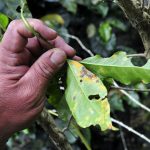MOTIVATION Global climate change impacts food and water security in significant ways, and developing countries will most likely bear the brunt of the adverse consequences. The lack of adaptive capacity and already high levels of poverty make these countries’ rural population and agriculture sector vulnerable. With support from the Federal Ministry for Economic Cooperation and >> Read more
Strategies for Adapting to Climate Change in Rural Africa
The impact of climate change will be most severe in tropical countries, like many countries in Africa south of the Sahara—particularly in those that have scarce resources to channel into adaptation strategies, whose policy makers lack information, and where there is significant poverty. Even small climate changes can have a significant impact on farmers’ livelihoods and overall wellbeing. With support from the Federal Ministry for Economic Cooperation and Development (BMZ) and the CGIAR Research Program on Climate Change, Agriculture, and Food Security (CCAFS), IFPRI worked with the Association for Strengthening Agricultural Research in Eastern and Central Africa (ASARECA), the Food, Agriculture and Natural Resources Policy Analysis Network (FANRPAN), and other national partners to generate country-level analyses on climate change impacts and adaptation strategies for 10 countries in East Africa and 8 countries in southern Africa. IFPRI published the results in three books released in 2013: East African Agriculture and Climate Change: A Comprehensive Analysis, Southern African Agriculture and Climate Change: A Comprehensive Analysis, and West African Agriculture and Climate Change: A Comprehensive Analysis.
Strengthening Resilience in Latin America
Climate change and agricultural diseases threaten the food security and livelihoods of many poor people in developing countries. IFPRI’s research in Latin America examined these environmental shocks, helping to bring the urgency of adaptation and mitigation to the forefront and to convince policy makers to act to build the poor’s resilience. In the 2000s, little >> Read more
Looking at Climate Change through the Gender Lens
On March 8, 2017, the world celebrates International Women’s Day. To understand women’s role in agriculture and to close the gender gap in agricultural production, IFPRI's research has been examining gender differences within rural households and communities for over 25 years.
Putting Agriculture at the Forefront of Global Climate Change Negotiations
IFPRI’s climate change research has played a critical role informing the global dialogue regarding agriculture and climate change. At COP22 on November 7-18, 2016, IFPRI will contribute its new research to place agriculture at the heart of the negotiations.
IFPRI and FAO Presenting Evidence-based Analysis of Key Issues in Food and Agriculture
The rich partnership between the Food and Agriculture Organization of the United Nations (FAO) and the International Food Policy Research Institute has been generating cutting-edge technical knowledge and enhanced expertise in support of food security and improved nutrition for all. One of the earliest and long-standing collaborations between FAO and IFPRI is centered on FAO’s >> Read more





